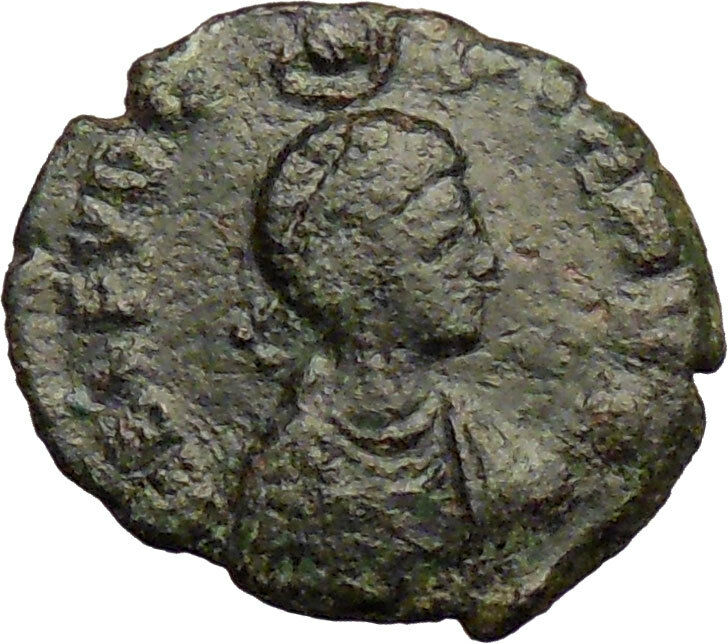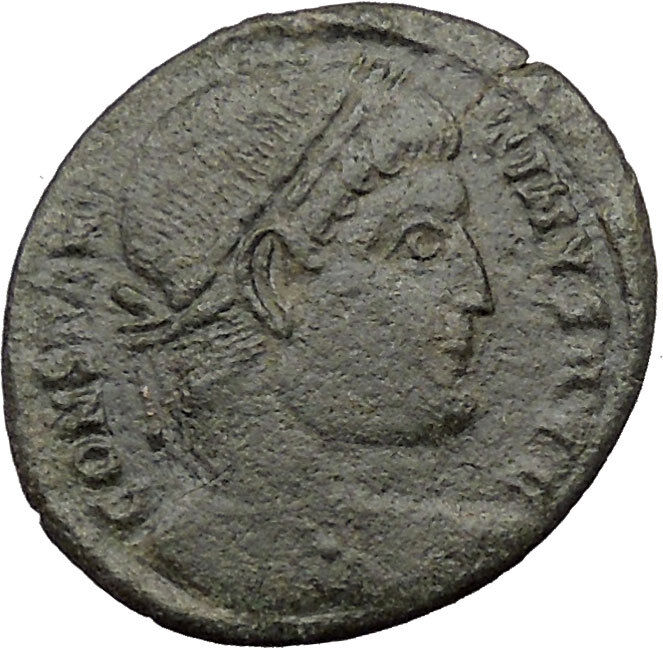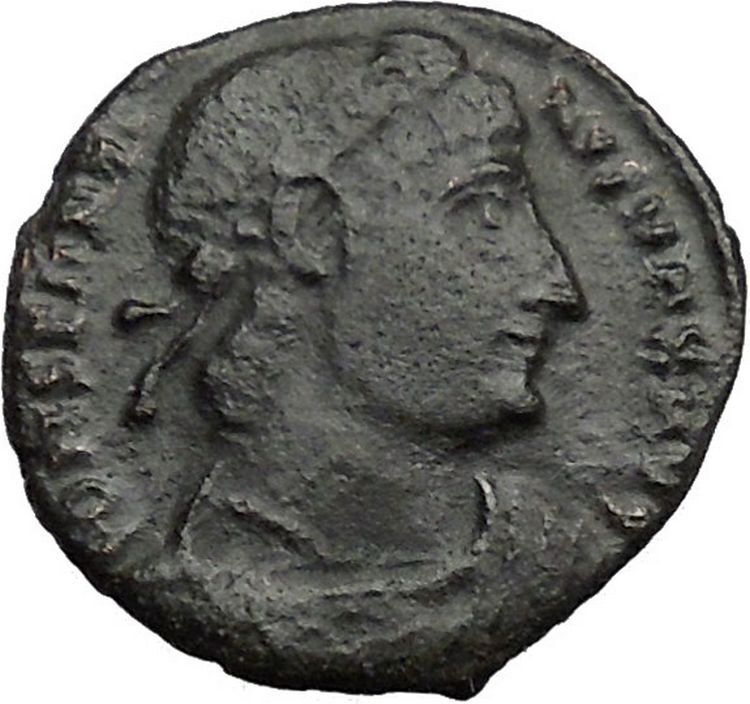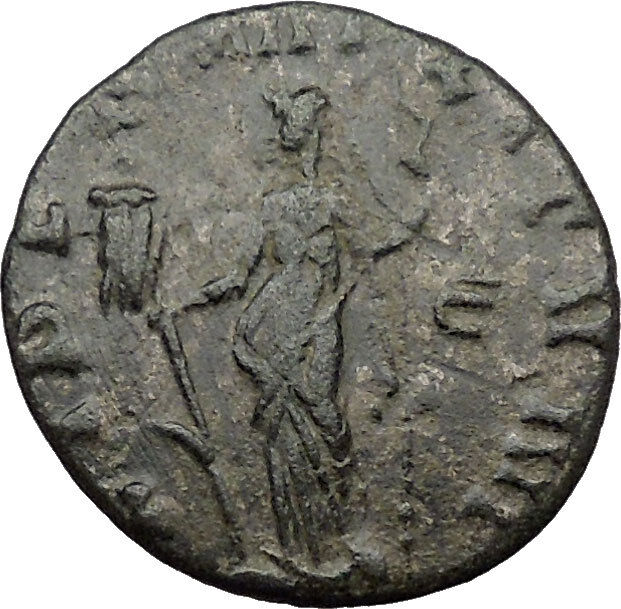|
Licinius II ‘Junior’ – Roman Caesar: 317-324 A.D.
Bronze AE3 19mm (2.90 grams) Heraclea mint, 3rd officina, struck 321-324 A.D.
Reference: RIC VII 54.
D N VAL LICIN LICINIVS NOB C helmeted and cuirassed bust of Licinius II to left, holding shield over his left shoulder and a spear over his right shoulder.
IOVI CONSERVATORI /X/IIΓ/ SMHA Jupiter standing facing head to left, holding eagle-tipped scepter with his left hand and Victory on globe with his extended right; at his feet to left, eagle to left head to right, presenting wreath to Jupiter; to right, bound captive seated on ground to right.
You are bidding on the exact item pictured, provided with a Certificate of Authenticity and Lifetime Guarantee of Authenticity.
 Jupiter, called Zeus by the Greeks. Jupiter was originally an elemental divinity, and his name signifies the father or lord of heaven, being a contraction of Diovis pater, or Diespiter. Being the lord of heaven, he was worshipped as the god of rain, storms, thunder, and lightning, whence he had the epithets of Pluvius, Fulgurator, Tonitrualis, Tonans, and Fulminator. As the pebble or flint stone was regarded as the symbol of lightning, Jupiter was frequently represented with such a stone in his hand instead of a thunderbolt. In concluding a treaty, the Romans took the sacred symbols of Jupiter, viz. the sceptre and flint stone, together with some grass from his temple, and the oath taken on such an occasion was expressed by per Jovem Lapidem jurare. In consequence of his possessing such powers over the elements, and especially of his always having the thunderbolt at his command, he was regarded as the highest and most powerful among the gods. Hence he is called the Best and Most High (Optimus Maximus). His temple at Rome stood on the lofty hill of the Capitol, whence he derived the surnames of Capitolinus and Tarpeius. He was regarded as the special protector of Rome. As such he was worshipped by the consuls on entering upon their office ; and the triumph of a victorious general was a solemn procession to his temple. He therefore bore the surnames of Imperator, Victor, Invictus, Stator, Opihdus, Feretrius, Praedator, Triumphator, and the like. Under all these surnames he had temples or statues at Rome ; and 2 temples, viz. those of Jupiter Stator and of Jupiter Feretrius, were believed to have been built in the time of Romulus. Under the name of Jupiter Capitolinus, he presided over the great Roman games ; and under the name of Jupiter Latialis or Latiaris, over the Feriae Latinae. Jupiter, according to the belief of the Romans, determined the course of all human affairs. He foresaw the future, and the events happening in it were the results of his will. He revealed the future to man through signs in the heavens and the flight of birds, which are hence called the messengers of Jupiter, while the god himself is designated as Prodigialis, that is, the sender of prodigies. For the same reason the god was invoked at the beginning of every undertaking, whether sacred or profane, together with Janus, who blessed the beginning itself. Jupiter was further regarded as the guardian of law, and as the protector of justice and virtue. He maintained the sanctity of an oath, and presided over all transactions which were based upon faithfulness and justice. Hence Fides was his companion on the Capitol, along with Victoria ; and hence a traitor to his country, and persons guilty of perjury, were thrown down from the Tarpeian rock. – As Jupiter was the lord of heaven, and consequently the prince of light, the white colour was sacred to him, white animals were sacrificed to him, his chariot was believed to be drawn by 4 white horses, his priests wore white caps, and the consuls were attired in white when they offered sacrifices in the Capitol the day they entered on their office. The worship of Jupiter at Rome was under the special care of the Flamen Dialis, who was the highest in rank of all the flamens. {The Romans, in their representations of the god, adopted the type of the Greek Zeus. Jupiter, called Zeus by the Greeks. Jupiter was originally an elemental divinity, and his name signifies the father or lord of heaven, being a contraction of Diovis pater, or Diespiter. Being the lord of heaven, he was worshipped as the god of rain, storms, thunder, and lightning, whence he had the epithets of Pluvius, Fulgurator, Tonitrualis, Tonans, and Fulminator. As the pebble or flint stone was regarded as the symbol of lightning, Jupiter was frequently represented with such a stone in his hand instead of a thunderbolt. In concluding a treaty, the Romans took the sacred symbols of Jupiter, viz. the sceptre and flint stone, together with some grass from his temple, and the oath taken on such an occasion was expressed by per Jovem Lapidem jurare. In consequence of his possessing such powers over the elements, and especially of his always having the thunderbolt at his command, he was regarded as the highest and most powerful among the gods. Hence he is called the Best and Most High (Optimus Maximus). His temple at Rome stood on the lofty hill of the Capitol, whence he derived the surnames of Capitolinus and Tarpeius. He was regarded as the special protector of Rome. As such he was worshipped by the consuls on entering upon their office ; and the triumph of a victorious general was a solemn procession to his temple. He therefore bore the surnames of Imperator, Victor, Invictus, Stator, Opihdus, Feretrius, Praedator, Triumphator, and the like. Under all these surnames he had temples or statues at Rome ; and 2 temples, viz. those of Jupiter Stator and of Jupiter Feretrius, were believed to have been built in the time of Romulus. Under the name of Jupiter Capitolinus, he presided over the great Roman games ; and under the name of Jupiter Latialis or Latiaris, over the Feriae Latinae. Jupiter, according to the belief of the Romans, determined the course of all human affairs. He foresaw the future, and the events happening in it were the results of his will. He revealed the future to man through signs in the heavens and the flight of birds, which are hence called the messengers of Jupiter, while the god himself is designated as Prodigialis, that is, the sender of prodigies. For the same reason the god was invoked at the beginning of every undertaking, whether sacred or profane, together with Janus, who blessed the beginning itself. Jupiter was further regarded as the guardian of law, and as the protector of justice and virtue. He maintained the sanctity of an oath, and presided over all transactions which were based upon faithfulness and justice. Hence Fides was his companion on the Capitol, along with Victoria ; and hence a traitor to his country, and persons guilty of perjury, were thrown down from the Tarpeian rock. – As Jupiter was the lord of heaven, and consequently the prince of light, the white colour was sacred to him, white animals were sacrificed to him, his chariot was believed to be drawn by 4 white horses, his priests wore white caps, and the consuls were attired in white when they offered sacrifices in the Capitol the day they entered on their office. The worship of Jupiter at Rome was under the special care of the Flamen Dialis, who was the highest in rank of all the flamens. {The Romans, in their representations of the god, adopted the type of the Greek Zeus.
Valerius Licinianus Licinius, Licinius II or Licinius the Younger (approx. 315-326), was the son of Roman emperor Licinius. He nominally served as Caesar in the eastern empire from 317 to 324 A.D while his father was Augustus. His mother was Licinius’ wife Flavia Julia Constantia, who was also the half-sister of Constantine I.
After his defeat by Constantine at the Battle of Chrysopolis, Licinius the elder was initially spared and placed in captivity at Thessalonica. However, within a year Constantine seems to have regretted his leniency and the former Emperor was hanged.
The younger Licinius, who was Constantine’s nephew, also fell victim to the emperor’s suspicions and was killed, probably in the context of the execution of Crispus in 326.
Other reports relate that Licinius the younger was forced into slavery in the imperial textile factories in Africa, where he is noted in 336. However, the imperial rescript of 336 makes it clear that the “son of Licinianus” referred to was not Licinius II as it directs that he be reduced to the slave status of his birth. No son of Constantine’s sister would have been referred to in this manner.
|





 Jupiter, called Zeus by the Greeks. Jupiter was originally an elemental divinity, and his name signifies the father or lord of heaven, being a contraction of Diovis pater, or Diespiter. Being the lord of heaven, he was worshipped as the god of rain, storms, thunder, and lightning, whence he had the epithets of Pluvius, Fulgurator, Tonitrualis, Tonans, and Fulminator. As the pebble or flint stone was regarded as the symbol of lightning, Jupiter was frequently represented with such a stone in his hand instead of a thunderbolt. In concluding a treaty, the Romans took the sacred symbols of Jupiter, viz. the sceptre and flint stone, together with some grass from his temple, and the oath taken on such an occasion was expressed by per Jovem Lapidem jurare. In consequence of his possessing such powers over the elements, and especially of his always having the thunderbolt at his command, he was regarded as the highest and most powerful among the gods. Hence he is called the Best and Most High (Optimus Maximus). His temple at Rome stood on the lofty hill of the Capitol, whence he derived the surnames of Capitolinus and Tarpeius. He was regarded as the special protector of Rome. As such he was worshipped by the consuls on entering upon their office ; and the triumph of a victorious general was a solemn procession to his temple. He therefore bore the surnames of Imperator, Victor, Invictus, Stator, Opihdus, Feretrius, Praedator, Triumphator, and the like. Under all these surnames he had temples or statues at Rome ; and 2 temples, viz. those of Jupiter Stator and of Jupiter Feretrius, were believed to have been built in the time of Romulus. Under the name of Jupiter Capitolinus, he presided over the great Roman games ; and under the name of Jupiter Latialis or Latiaris, over the Feriae Latinae. Jupiter, according to the belief of the Romans, determined the course of all human affairs. He foresaw the future, and the events happening in it were the results of his will. He revealed the future to man through signs in the heavens and the flight of birds, which are hence called the messengers of Jupiter, while the god himself is designated as Prodigialis, that is, the sender of prodigies. For the same reason the god was invoked at the beginning of every undertaking, whether sacred or profane, together with Janus, who blessed the beginning itself. Jupiter was further regarded as the guardian of law, and as the protector of justice and virtue. He maintained the sanctity of an oath, and presided over all transactions which were based upon faithfulness and justice. Hence Fides was his companion on the Capitol, along with Victoria ; and hence a traitor to his country, and persons guilty of perjury, were thrown down from the Tarpeian rock. – As Jupiter was the lord of heaven, and consequently the prince of light, the white colour was sacred to him, white animals were sacrificed to him, his chariot was believed to be drawn by 4 white horses, his priests wore white caps, and the consuls were attired in white when they offered sacrifices in the Capitol the day they entered on their office. The worship of Jupiter at Rome was under the special care of the Flamen Dialis, who was the highest in rank of all the flamens. {The Romans, in their representations of the god, adopted the type of the Greek Zeus.
Jupiter, called Zeus by the Greeks. Jupiter was originally an elemental divinity, and his name signifies the father or lord of heaven, being a contraction of Diovis pater, or Diespiter. Being the lord of heaven, he was worshipped as the god of rain, storms, thunder, and lightning, whence he had the epithets of Pluvius, Fulgurator, Tonitrualis, Tonans, and Fulminator. As the pebble or flint stone was regarded as the symbol of lightning, Jupiter was frequently represented with such a stone in his hand instead of a thunderbolt. In concluding a treaty, the Romans took the sacred symbols of Jupiter, viz. the sceptre and flint stone, together with some grass from his temple, and the oath taken on such an occasion was expressed by per Jovem Lapidem jurare. In consequence of his possessing such powers over the elements, and especially of his always having the thunderbolt at his command, he was regarded as the highest and most powerful among the gods. Hence he is called the Best and Most High (Optimus Maximus). His temple at Rome stood on the lofty hill of the Capitol, whence he derived the surnames of Capitolinus and Tarpeius. He was regarded as the special protector of Rome. As such he was worshipped by the consuls on entering upon their office ; and the triumph of a victorious general was a solemn procession to his temple. He therefore bore the surnames of Imperator, Victor, Invictus, Stator, Opihdus, Feretrius, Praedator, Triumphator, and the like. Under all these surnames he had temples or statues at Rome ; and 2 temples, viz. those of Jupiter Stator and of Jupiter Feretrius, were believed to have been built in the time of Romulus. Under the name of Jupiter Capitolinus, he presided over the great Roman games ; and under the name of Jupiter Latialis or Latiaris, over the Feriae Latinae. Jupiter, according to the belief of the Romans, determined the course of all human affairs. He foresaw the future, and the events happening in it were the results of his will. He revealed the future to man through signs in the heavens and the flight of birds, which are hence called the messengers of Jupiter, while the god himself is designated as Prodigialis, that is, the sender of prodigies. For the same reason the god was invoked at the beginning of every undertaking, whether sacred or profane, together with Janus, who blessed the beginning itself. Jupiter was further regarded as the guardian of law, and as the protector of justice and virtue. He maintained the sanctity of an oath, and presided over all transactions which were based upon faithfulness and justice. Hence Fides was his companion on the Capitol, along with Victoria ; and hence a traitor to his country, and persons guilty of perjury, were thrown down from the Tarpeian rock. – As Jupiter was the lord of heaven, and consequently the prince of light, the white colour was sacred to him, white animals were sacrificed to him, his chariot was believed to be drawn by 4 white horses, his priests wore white caps, and the consuls were attired in white when they offered sacrifices in the Capitol the day they entered on their office. The worship of Jupiter at Rome was under the special care of the Flamen Dialis, who was the highest in rank of all the flamens. {The Romans, in their representations of the god, adopted the type of the Greek Zeus.




